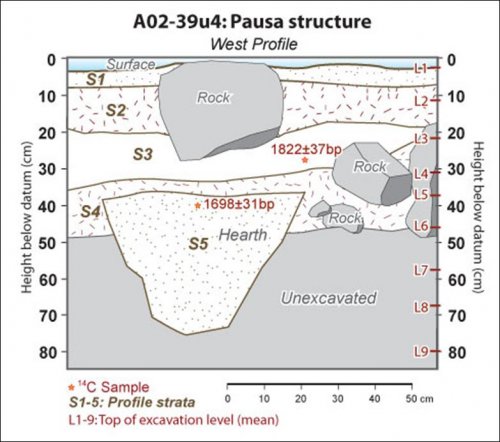Stratigraphy
The local test unit datum for both of these units was placed on a large, flat rock that is part of the A03-558 oval that lies just to the south of TU3. This mapping station, as well as the site datum north, are shown in Figure 7-32 in the positions where they were mapped with a total station in 2004.
|
Level |
H.B.D.* |
Contents |
Soil |
Photo # |
|
1 |
5 |
Top surface. Roots |
Fine sandy volcanic soil, roots from low brush |
2638 |
|
2 |
12.5 |
F1: NW of rocks, 0a: matrix. Roots |
V. Dk Grey/Brown 10YR3/2, fine grain, sub-angular,poorly sorted .7/.5 |
2641 |
|
3 |
17.5 |
F1, F2, 0a. Roots |
Dark brown 7.5YR4/2, subangular blocky, med grain, poorly sorted, .7/.3 |
2646 |
|
4 |
32 |
F1: midden, indoor? F3: light, sterile Roots, lithics, ceramics |
F1: V. Dk Grey/Brown 10YR3/2 Fine grain, subrounded, well-sorted, .9/.7; F3: Brown 7.5YR4/3, med grain, poorly sorted, .9/.5 |
2650-2651 |
|
5 |
44 |
F1 |
Dark brown 7.5YR4/2, subangular blocky, med grain, poorly sorted, .9/.5 |
2661-2663 |
|
6 |
56 |
F1a, F3 Lg chert flake lying flat, organic soil |
F1a: Dark brown 7.5YR3/2, med grain, well sorted, .9/.7; F3: Brown 7.5YR4/3, med grain, poorly sorted, .9/.3 |
2664, 3035-3414 |
|
* HBD = mean height below datum in centimeters for the top of each level based on five depth measurements. |
||||
Table 7-27. A02-39u3 test unit. Excavation levels, overview, and soil description.
|
Level |
H.B.D |
Contents |
Soil |
Photos |
|
1 |
3 |
S1: Top surface Rocky soil, obsidian and non-diagnostic ceramics |
Compacted, roots. |
2649 |
|
2 |
14 |
S2: F1: N side; F2: S side Rocks and roots, fewer artifacts |
F1: Dark brown 7.5YR3/2, silty sand,med grain, poorly sorted, .7/.5 |
2665 |
|
3 |
23 |
S3: F1, F2 Yellowish grey wall mortar. Black-on-red sherd in wall. |
Dark brown 7.5YR3/2, silty sand, subangular blocky, med grain, poorly sorted, .9/.3 |
2680 |
|
4 |
32 |
S3: F1, F2 Small charcoal pieces. Greyish brown poss. Midden.14C: 1822±37 bp |
F1: Alluvial, V. Dk Grey/Brown: 10YR3/2, silty sand, med grain, poorly-sorted,.9/.3. F2: Dk brown 7.5YR3/2, silt, subangular blocky, fine grain, poorly-sorted, .9/.3 |
3012 |
|
5 |
37 |
S4: F1,F2,F3 Less compact, carbon, ceramic, bone, charcoal, much obsidian. |
F1: V. Dk Grey 7.5YR4/1, subangular blocky, coarse, poorly sorted, .9/.7 |
3016 |
|
6 |
49 |
S5: F1,F2,F3 Less compact, carbon, ceramic, bone, charcoal.14C: 1698±31 bp |
Dark brown 7.5YR3/2, silty clay, subangular blocky, poorly sorted. F1: fine grain .9/.3, F2: coarse grain, .9/.3, F3: med grain, .9/.3 |
3033-3034. 3416-3417 |
|
7 |
58 |
S5: F4. Hearth only. Compact, fine clayey soils around hearth. |
Dark brown 7.5YR3/2, silty clay, fine grain, subangular blocky, poorly sorted, .5/.5 |
3423 |
|
8 |
68 |
S5: F4. Hearth only. Compact, fine clayey soils around hearth. Torquoise. |
Dark brown 7.5YR3/2, silty clay, fine grain, subangular blocky, poorly sorted, .5/.5 |
3424-3425 |
|
9 |
80 |
S5: F4. Hearth only. Compact, fine clayey soils around hearth. |
Dark brown 7.5YR3/2, silty clay, fine grain, subangular blocky, poorly sorted, .5/.5 |
3426-3427 |
|
* HBD = mean height below datum in centimeters for the top of each level based on five depth measurements. |
||||
Table 7-28. A02-39u4 test unit. Excavation levels, overview, and soil description.
Figure 7-33. A02-39u4 Pausa test unit west profile diagram showing strata and levels.
Radiocarbon dates recovered from levels 3 and 5 of Unit 4 are temporally inverted, but they overlap in the 2-sigma error ranges. These dates place the later use of the hearth in the vicinity of AD200, or the Upper Formative. At units 3 and 4 at Pausa showed a relatively high percentage of obsidian by count throughout the sequence (83%), although by weight obsidian was somewhat less dominant (58%), while volcanics became more prominent (33%).

